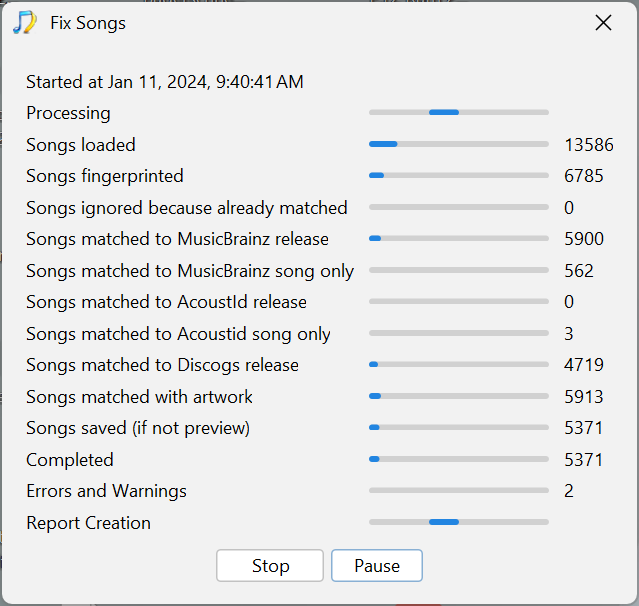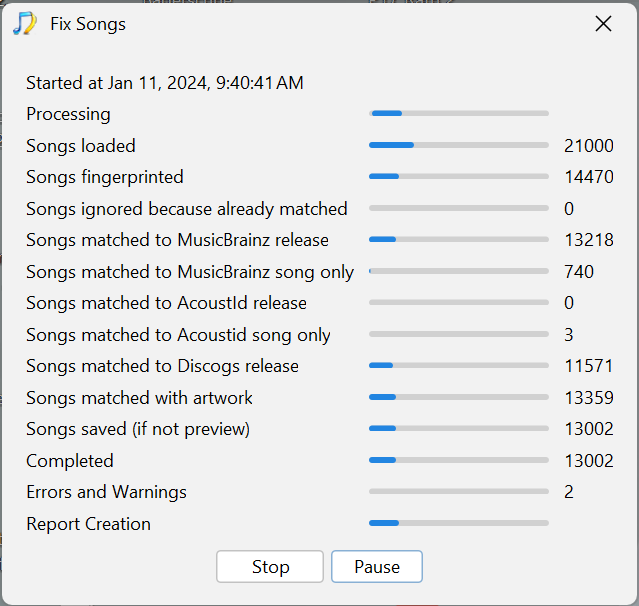As is order annoyingly. Which you can at least change but then it’s changing your version of the album. Had one the other day where the album exists as do all the tracks just in Roon it had a completely different sequencing.
I shut my PC down every night. Its a resource hog and i wont leave in standby.
Roon restarts every day and is as it was the day before.
If i am gaming then roon core gets turned off too. Cant have both running and dont need roon when gaming
I have never had a prob. That doesnt mean that others don’t
Thank you Paul. Just started “in one go” for the part ripped from my CD collection in preview mode (with roon preset), Will take some time.
Just tried with the most obvious one, “10cc - 10cc”. Artist/Album yield ten matches. Chose the first that was #about# right. No matches at all for “3 Falkner - ja ja” or “Das Pferd - Ao Vivo”. Three other albums of “Das Pferd” had been matched nicely before, so this band is not that obscure.
What it comes down to is how Roon handles a no-match situation. Seems they believe their results are great and act based on this. While the results are actually just soso outside of mainstream stuff.
Maybe this is true…it hasn’t seemed so to me in the sense that I have quite a few unidentified albums that are just different releases of very popular and identified albums. But perhaps the bigger point here is that the album identification process, including that crossword puzzle of a track-matching (up, down, up, up up, down) is a massive PITA. Given the time it takes to possibly get Roon to identify an album, it is easy to see why, if someone has hundreds or thousands of unidentified albums, they would look at that task and say “no thank you.”
I had no idea. So this is why when I’m in research mode and adding albums to playlists to explore a new area of music, Roon gets so backed up (or used to - I have not seen that problem for a while but I guess I also haven’t been exploring much lately). That architecture seems crazy to me. So not only is it a PITA to have unidentified albums (Roon Radio would never play them), but that also detrimentally affects performance.
Seems like poor architecture to me.
I look at what the Roon team has accomplished in terms of the overall product and how much it can do compared to most of its competition and it’s a marvel. But it seems that marvel comes with a lot of substantial compromises or bad development choices too.
This is why I get frustrated when Roon rolls out more ARC upgrades and leaves the main product without substantial improvement over several years. The last release was totally focused on ARC. I know there are people who love ARC and are happy to get those updates, so I am happy for them, but I would humbly suggest that Roon needs to get back to the core Roon product, albeit I am concerned that will never really happen due to the Harman acquisition.
Roon may be what it is now forever, other than favored baby ARC.
How long it takes depend on a number of things:
- files local or on network
- existing metadata of music files
- folder organization of music files
- computer cpu
- computer memory
- computer internet connectivity
- selected songkong options
But on a general purpose pc processing local files I would suggest about 10,000 songs an hour. So if your library is 850,000 files that should take about 4 days, however although SongKong is designed for libraries of any size there are some buffers that do get larger over time so it is possible it may slow down at some point. If that is the case and you decide to Stop the task only press Stop once this will cause SongKong to stop processing anymore files but it will then go away and create the report so you have full details of the songs that have been processed.
Right now I am doing the lossless files. About 6 hours into the operation this is the status, which is fine. I am not writing changes, just want to know what (percentage) is matched and what is not.
Thank you for pointing out what the stop button does. Just pressed it, and unfortunately pressed it again because songkong was not responding. Which killed the report. Will be more patient next time (tonight).
Edit: Just started processing the lossy files for a change. This seems to be much faster when it comes to loading.
Roon seriously needs more metadata sources not having Discogs is a pain as it doesn’t matter how good your metadata is if it doesn’t exist in the two sources Roon uses it will never be identified. The majority of mine are all in Discogs just not Allmusic or MusicBrainz.
Sounds like they are, though, working on it:
I will always have hundreds of albums that will fall outside of any of the metadata services and will never be identified by Roon. So apparently, that is the cause of poor performance because Roon will always be searching the metadata sources attempting to match them. So why can’t there be a flag that the user can set for an album to tell Roon not to attempt to identify it - ever. I get the point that @connor is making about Roon not being a “professional file management service”, but this type of flag would seem like a simple solution to allow me to add this type of content to my library with little impact.
It would also be helpful if focus had a way of identifying tracks that are no longer available. That way a user could clear them out and cut down on bloat.
Library clean up reports have been one of my suggestions since 2016. There needs to be a way, imho, to let users know that a streaming service has dropped an album that is in their library. Currently, I export my Qobuz library to excel and do a list compare (outside of Roon) every quarter or so to let me know what might have been dropped/changed/etc.
Sounds like an explanation which is matching my experience when roon was showing similar behavior on my outdated machine earlier this year. I noticed when adding folders with lots of unidentifiable albums (mainly DSD) and a lot of references to existing artists, things slowed down like crazy eventually bringing my machine to a standstill.
When reducing the number of unidentified albums and DSD in particular, even my outdated server is still capable of running roon smoothly and my new one is really snappy.
Would not go so far to blame roon´s architecture. It is simply not meant for dealing with a high number of obscure non-standardized albums such as bootlegs, blu-ray rips and alike as well as an extreme library.
In most cases I managed to identify the albums manually declaring them to be vinyl or DVD rips in roon. So in the end I only have below 100 albums being not identified and that seems to be okay.
I agree but with discogs things seem not to be as easy as many albums exist in various versions and there is no consistent rules how to tag them (unlike in MusicBrainz).
We will continue to disagree here I believe. Not being in metadata services should not cause performance issues and seems shortsighted given metadata is spotty at best and there is no unified standards system or service in place. They seem to have vastly underestimated the user base and what they require.
I don’t have the issues large library users have but fully sympathise with them. It seems Roon really isn’t the ultimate choice it claims to be and its the main selling point of the app, the enriched metadata thats holding it back as it has negative affects on performance.
I do not see much of a disagreement here. In an ideal world, for sure handling unidentifiable albums should work smoothly without performance issues. And I assume it does with the majority of cases if the hardware is meeting the minimum specs.
The question we both cannot answer is: Which vital features of roon are relying on these computing-intense processes causing the issues? If a routine to partially deactivate the routines for unidentified albums would not cause major flaws, I am in for such a solution. If a lot of cool features stop working, it might be a subject for discussion.
What certainly leaves room for improvement is how the software (as well as the company) is handling cases bringing the capacities to their limits. I wished there would be an indicator that one is running out of CPU/networking/RAM power or an indicator how many albums are left to be added. As a user-friendly alternative I see the possibility to deactivate features that are overstressing the machine. Such as the ´audio analysis - throttled / 1 core / 2 cores / all cores´ setting in Library. This might help people having the feeling of frustration as they could at least proceed with a ´leaner´ roon.
I assume it is not such a widespread problem as we regulars in the forum might think with a significant number of users experiencing problems due to their underpowered hardware or extrem structure of library. I personally had both issues at the same time and solved it by simply exchanging the hardware and putting a bit of effort into sorting out the obscure parts of my library.
It is in my humble opinion merely a matter of how to communicate the limits of your product and give users a sense of understanding what they can or cannot do with it.
In the majority of cases libraries are small enough to cover the performance issues with “better” hardware. Unfortunately the problem develops in a nonlinear manner while hardware scales in a linear fashion. There is a point you cannot get a solution by throwing hardware on it.
The new Titan is advertised as handling “the most voluminous music libraries”. So it might be the solution to your issues.
FWIW - I’ve had more slowness problems with my WD MyCloud than Roon. Do you restart that periodically as well?
Yeah, I wonder how this will go if people buy a Titan for 3.5K+ for handling “the most voluminous music libraries” if they then find out it’s “unless you have lots of unidentified albums, or many artists with more than 100 albums, or many albums/boxsets with more than 100 tracks” ![]()
Edit: Though to be fair I think they are working on the too many albums/tracks IIRC but I’m unsure what the plan is for unidentified stuff and certain problematic folder structures. @connor’s post doesn’t seem encouraging and I’m a bit bummed that my long-term plan of adding e.g., Sonic Youth’s and Giant Sand’s live archives seems thwarted
I doubt it. I think that to the point of @Connor 's post above, there are some really important caveats to using Roon, which aren’t clearly stated in the marketing or even technical docs. So maybe it would be more accurate to say: “the most voluminous libraries where all local content is identifiable by our metadata services”…

